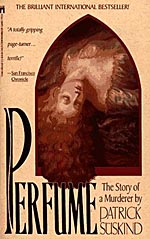
![]() Rhondak101
Rhondak101
4/14/2014
![]()
Passes the Smell Test
I bought Patrick Süskind's Perfume back in the 80s when it first came out. I started it, put it down and never returned to it. I don't remember why I put it down. Eventually, I gave it away. So now many years later, I have returned to it for the Bucket List and Translation challenges, and I very am glad I did. Perfume is a beautifully written story marking the development of a serial killer and psychopath.
The book begins with Jean-Baptiste Genouille's birth in 1738. In the squalor of a Parisian fish stall, his mother gives birth to him among the fish guts. Believing (or hoping) he is a stillbirth like her previous four, she leaves him to die, but her act is discovered. She is subsequently tried and killed for infanticide and attempted infanticide. Jean-Baptiste's first wet nurse rejects him because he's "pumped me dry down to the bones" and because he eerily has no smell. The wet nurse finds the baby creepy. Luckily, his next caretaker, Madame Gaillard, had no sense of smell, so she does not know what he is lacking. Ironically, the baby with no natural odor has an acute sense of smell himself. For Jean-Baptiste, smell gives him the ability to negotiate the world. He can "see" in the dark because he can smell each object distinctly and locate it. Süskind indicates that Jean-Baptiste needs little in the way of creature comforts as long as he can experience and collect new smells. Süskind compares him to a tick:
Or like that tick in the tree, for which life has nothing better to offer than perpetual hibernation. The ugly little tick, which by rolling its blue-gray body up into a ball offers the least possible surface to the world; which by making its skin smooth and dense emits nothing, lets not the tiniest bit of perspiration escape. The tick, which makes itself extra small and inconspicuous so that no one will see it and step on it. The lonely tick, which, wrapped up in itself, huddles in its tree, blind, deaf, and dumb, and simply sniffs, sniffs all year long, for miles around, for the blood of some passing animal that it could never reach on its own power.
Jean-Baptiste and the tick wait and wait for opportunity and when it comes they seize it. The first part of the book demonstrates Jean-Baptiste's path from ward of Madame Gaillard, to apprentice tanner, to apprentice perfumer, to journeyman perfumer. This section describes Jean-Baptiste's prodigious talent in perfumery and teaches the reader many interesting things about the 18th-century perfume business. The second section demonstrates Jean-Baptiste's "tick phase," in which Süskind clearly demonstrates his psychopathic tendencies.
The last two sections of the book are fascinating as they explore the power Jean-Baptiste holds because he has no natural smell and can create smells for himself that create varied emotions in those who smell him. The premise that Süskind puts forth is fascinating: humans judge individuals by subtle smells and the one who can control his own smell can control his world. I won't divulge more than this. The story is creepy, not because it is gruesome or gratuitous, but because Jean-Baptiste's psyche and motives seem so believable even though his olfactory abilities do not.
I loved this book and I'm so glad that I *finally* got around to reading it.